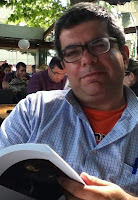.jpg) Kechriotis specializes in late Ottoman history, Christian and Jewish communities in the Balkans and elsewhere in the Ottoman Empire, nationalism, and Ottoman urban history and imperial ideology. His dissertation, completed in 2005, is entitled: "The Greeks of Izmir at the end of the Empire a non-Muslim Ottoman Community between autonomy and Patriotism."
Kechriotis specializes in late Ottoman history, Christian and Jewish communities in the Balkans and elsewhere in the Ottoman Empire, nationalism, and Ottoman urban history and imperial ideology. His dissertation, completed in 2005, is entitled: "The Greeks of Izmir at the end of the Empire a non-Muslim Ottoman Community between autonomy and Patriotism."
Interview Themes
PART I
On how Kechriotis came to study late Ottoman history (1:30)Why Greeks became more interested in Ottoman history after 1999/2000 (8:20)
On the fruit of the recent convergence of young Greek and Turkish scholars on late Ottoman history (12:00)
Kechriotis’ take on how Greeks and Turks relate to that history and his work on Izmir (16:05)
Can a good historian do politics? Is there a politics that allows for the inclusion of detail? (41:05)
PART II
What is the historian's role in bringing societies to a meaningful engagement with their past (0:00)How we should be training the next generation of historians in the field (6:55)
Kechriotis' long-term scholarly agenda (13:40)
To access the interview, click here: http://hdl.handle.net/1813/30797